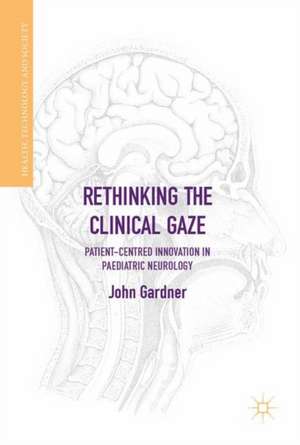Rethinking the Clinical Gaze: Patient-centred Innovation in Paediatric Neurology: Health, Technology and Society
Autor John Gardneren Limba Engleză Hardback – 13 iun 2017
This book draws on medical sociology and science and technology studies to develop a novel conceptual framework for understanding innovation processes, using the case study of deep brain stimulation in paediatric neurology. It addresses key questions, including: How are promising and potentially disruptive new health technologies integrated into busy resource-constrained clinical contexts? What activities are involved in establishing a new clinical service? How do social and cultural forces shape these services, and importantly, how are understandings of ‘health’ and ‘illness’ reconfigured in the process? The book explores how the ideals of patient-centred medicine influence innovation in the clinic, and it introduces the concept of patient-centred proto-platforms. It argues that patient-centred innovation can constitute an expansion of medical power, as the clinical gaze is directed not only towards the body but also towards the patient as a social being. This willbe an innovative and insightful read for academics and advanced students, as well as health service researchers with an interest in technology adoption processes.
| Toate formatele și edițiile | Preț | Express |
|---|---|---|
| Paperback (1) | 384.31 lei 6-8 săpt. | |
| Springer International Publishing – aug 2018 | 384.31 lei 6-8 săpt. | |
| Hardback (1) | 390.46 lei 6-8 săpt. | |
| Springer International Publishing – 13 iun 2017 | 390.46 lei 6-8 săpt. |
Din seria Health, Technology and Society
-
 Preț: 280.10 lei
Preț: 280.10 lei - 5%
 Preț: 716.09 lei
Preț: 716.09 lei - 5%
 Preț: 841.37 lei
Preț: 841.37 lei - 18%
 Preț: 895.58 lei
Preț: 895.58 lei - 15%
 Preț: 642.51 lei
Preț: 642.51 lei - 18%
 Preț: 781.00 lei
Preț: 781.00 lei -
 Preț: 385.84 lei
Preț: 385.84 lei -
 Preț: 391.22 lei
Preț: 391.22 lei -
 Preț: 423.84 lei
Preț: 423.84 lei - 5%
 Preț: 458.23 lei
Preț: 458.23 lei - 5%
 Preț: 719.19 lei
Preț: 719.19 lei - 15%
 Preț: 584.92 lei
Preț: 584.92 lei - 5%
 Preț: 372.97 lei
Preț: 372.97 lei - 5%
 Preț: 717.00 lei
Preț: 717.00 lei - 15%
 Preț: 639.73 lei
Preț: 639.73 lei - 15%
 Preț: 640.24 lei
Preț: 640.24 lei -
 Preț: 392.60 lei
Preț: 392.60 lei - 15%
 Preț: 640.88 lei
Preț: 640.88 lei -
 Preț: 388.13 lei
Preț: 388.13 lei - 5%
 Preț: 725.96 lei
Preț: 725.96 lei - 5%
 Preț: 462.63 lei
Preț: 462.63 lei -
 Preț: 389.88 lei
Preț: 389.88 lei -
 Preț: 387.75 lei
Preț: 387.75 lei - 15%
 Preț: 635.80 lei
Preț: 635.80 lei - 18%
 Preț: 786.36 lei
Preț: 786.36 lei - 5%
 Preț: 370.38 lei
Preț: 370.38 lei - 15%
 Preț: 641.71 lei
Preț: 641.71 lei - 5%
 Preț: 368.37 lei
Preț: 368.37 lei - 18%
 Preț: 786.66 lei
Preț: 786.66 lei - 5%
 Preț: 366.56 lei
Preț: 366.56 lei -
 Preț: 384.86 lei
Preț: 384.86 lei
Preț: 390.46 lei
Nou
Puncte Express: 586
Preț estimativ în valută:
74.72€ • 81.14$ • 62.77£
74.72€ • 81.14$ • 62.77£
Carte tipărită la comandă
Livrare economică 22 aprilie-06 mai
Preluare comenzi: 021 569.72.76
Specificații
ISBN-13: 9783319532691
ISBN-10: 3319532693
Pagini: 172
Ilustrații: XVII, 250 p. 4 illus.
Dimensiuni: 148 x 210 mm
Greutate: 0.47 kg
Ediția:1st ed. 2017
Editura: Springer International Publishing
Colecția Palgrave Macmillan
Seria Health, Technology and Society
Locul publicării:Cham, Switzerland
ISBN-10: 3319532693
Pagini: 172
Ilustrații: XVII, 250 p. 4 illus.
Dimensiuni: 148 x 210 mm
Greutate: 0.47 kg
Ediția:1st ed. 2017
Editura: Springer International Publishing
Colecția Palgrave Macmillan
Seria Health, Technology and Society
Locul publicării:Cham, Switzerland
Cuprins
1.Introduction: where great need meets great uncertainty.- 2. Understanding innovation & the problem of technology adoption.- 3. A history of deep brain stimulation.- 4. Multidisciplinary teamwork.- 5. Body work & space.- 6. Managing expectations, aligning futures.- 7. Measuring clinical outcomes.- 8. Towards patient-centred platforms.
Recenzii
“In this well-documented book, Gardner surveys and assimilates a wide array of theoretical insights that examine this pioneering team in practice. … Gardner’s insightful history of DBS, and the crucial role played by clinical assessment tools in the innovation and governance of medical practices, make his monograph highly instructive. … Gardner articulates a pragmatic assessment that is based on an observation of actual medical practices. Hence, his book remains an important and unique contribution.” (Marilena Pateraki, New Genetics and Society, March, 2018)
Notă biografică
John Gardner is a Research Fellow in the School of Social Sciences at Monash University, Melbourne, Australia. His research is situated in medical sociology and science and technology studies, and he has published widely on neurostimulation, regenerative medicine, and innovation.
Textul de pe ultima copertă
This book draws on medical sociology and science and technology studies to develop a novel conceptual framework for understanding innovation processes, using the case study of deep brain stimulation in paediatric neurology. It addresses key questions, including: How are promising and potentially disruptive new health technologies integrated into busy resource-constrained clinical contexts? What activities are involved in establishing a new clinical service? How do social and cultural forces shape these services, and importantly, how are understandings of ‘health’ and ‘illness’ reconfigured in the process? The book explores how the ideals of patient-centred medicine influence innovation in the clinic, and it introduces the concept of patient-centred proto-platforms. It argues that patient-centred innovation can constitute an expansion of medical power, as the clinical gaze is directed not only towards the body but also towards the patient as a social being. This will be an innovative and insightful read for academics and advanced students, as well as health service researchers with an interest in technology adoption processes.
Caracteristici
Innovatively intertwines STS studies and medical sociology, taking a Foucauldian lens to understand the impact of patient-centricity on technical innovations Explores the topical fields of medical innovations and neurotechnologies Discusses problems that can arise with the introduction of new health technologies














